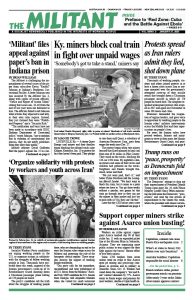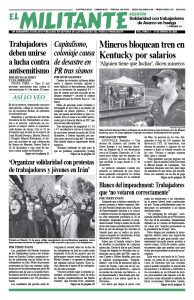In the U.S. rulers’ latest move to ratchet up their almost six-decade-long economic war on the Cuban Revolution, the administration of President Donald Trump announced Jan. 10 it would bar all charter flights to nine regional airports in Cuba. It also capped charter flights to the international airport in Havana at last year’s level of 3,600 round trips. These new restrictions go into effect after “a 60-day wind-down period.”
Secretary of State Mike Pompeo said the move was to further impede “the Cuban regime from gaining access to hard currency from U.S. travellers.” Promoting Washington’s slander campaign against the Cuban Revolution, Pompeo claimed the new strictures were retaliation for the Cuban government’s “ongoing oppression of the Cuban people” and “support for dictator Nicolás Maduro in Venezuela.”
The U.S. rulers — under Democratic and Republican administrations alike — have targeted Cuba’s socialist revolution since workers and farmers overthrew the Washington-backed Fulgencio Batista dictatorship in 1959 and took political power into their own hands.
The U.S. government continues to try to bring down the Venezuelan government, despite being frustrated by the failure of the opposition politicians it backs to oust Maduro. Washington has since sanctioned any oil tankers that take Venezuelan petroleum to Cuba. It hopes to weaken and undermine both the Cuban Revolution and the Venezuelan government.
The ban on charter flights to provincial airports will mainly affect thousands of Cuban Americans wanting to travel to the island to visit relatives. Over half a million such visits took place last year.
Charter flights to Cuban cities have expanded since Washington banned commercial flights to all Cuban airports except Havana last December.
Anti-Cuba lawsuits thrown out
Two days earlier Washington suffered a reversal when a federal court in Miami threw out lawsuits against Norwegian Cruise Line Holdings and MSC Cruises over their use of the Havana cruise terminal. The administration opened the floodgates for suits like this when it ended the longstanding suspension of Title III of the notorious Helms-Burton Act that invites relatives of prerevolution capitalist property owners to sue for damages because the revolution nationalized their assets.
Carnival Cruise Lines and Royal Caribbean Cruises, facing a similar lawsuit, are likely to use this decision to seek to have their cases dismissed as well. All of these suits have been pushed by Mickael Behn, grandson of the capitalist owner of the company that ran Havana’s docks before 1959.
Cuban officials report that nearly 900,000 people took cruises to the island in 2018. Carnival had plans for more routes and cruises before the Trump administration imposed a ban on cruise ships to Cuban ports last June.

